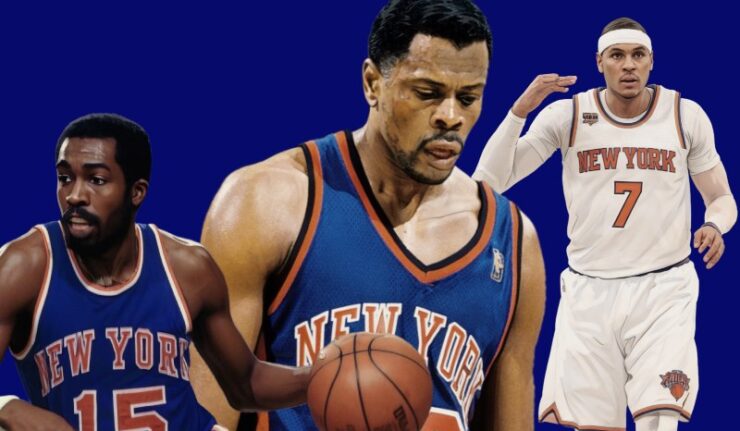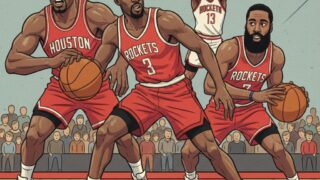The roar is different. In the concrete canyons of Manhattan, inside the world’s most famous arena, the game of basketball is more than just a sport; it’s the city’s heartbeat. To play for the New York Knicks is to embrace the glare of the Garden lights, to perform on a stage where legends are made and scrutinized with an intensity unmatched anywhere else.
The hardwood at Madison Square Garden has been graced by titans of the game, players who embodied the grit, flash, and relentless spirit of New York City itself. They carried the weight of a demanding fanbase and, in return, were immortalized.
Assembling an all-time team from this storied franchise isn’t just an exercise in statistics; it’s about capturing the soul of New York basketball. It’s a roster built on championship pedigree, individual brilliance, and an unbreakable toughness forged in the crucible of MSG. This is the ultimate collection of talent to ever wear the blue and orange.
Head Coach: Red Holzman
There can be only one man to lead this team. Red Holzman wasn’t just a coach; he was an architect. He crafted the beautiful, selfless style of basketball known as “The City Game,” which brought two NBA championships to New York in 1970 and 1973. His philosophy was simple yet profound: “See the ball, help the helper, and hit the open man.” He transformed a collection of talented individuals into a cohesive, intelligent, and relentless unit that played with a synergy rarely seen. Holzman’s calm demeanor and brilliant basketball mind would be the perfect guiding force to manage the immense talent and personalities on this roster. He is, and always will be, the definitive Knicks coach.
Willis Reed, Center
The Captain. No player in Knicks history better personifies leadership, heart, and sheer force of will than Willis Reed. His defining moment—limping onto the court with a torn thigh muscle in Game 7 of the 1970 NBA Finals—is etched into the very soul of the sport. But Reed was far more than one iconic moment. He was a dominant force, a bruising center who could score, rebound, and defend with the best of them. As the first player in NBA history to be named regular season MVP, All-Star Game MVP, and Finals MVP in the same season (1970), his peak was monumental. Reed was the anchor of both Knicks championship teams, a two-time Finals MVP whose presence guaranteed toughness and accountability. On an all-time team, he is the unquestioned leader.
RELATED: 100 Greatest Players in NBA History
Patrick Ewing, Center
For fifteen years, Patrick Ewing was the New York Knicks. He was the warrior at the center of the franchise, a relentless competitor who carried the team on his broad shoulders through the grueling wars of the 1990s. Drafted as the franchise savior in 1985, Ewing delivered on that promise with a Hall of Fame career defined by dominance on both ends of the floor. His signature turnaround jumper was automatic, and his intimidating presence in the paint made him one of the greatest defensive centers of his era. An 11-time All-Star and the franchise’s all-time leader in points, rebounds, blocks, and steals, Ewing’s legacy is one of unwavering effort and greatness, even without the championship ring that eluded him. He gave everything to the city and deserves his place among the giants.
Dave DeBusschere, Power Forward
If Willis Reed was the heart of the championship teams, Dave DeBusschere was the soul. Acquired in a mid-season trade in 1968, he was the final, crucial piece of the championship puzzle. A rugged, intelligent, and tenacious defender, DeBusschere did all the dirty work required to win. He was a relentless rebounder and a brilliant team defender whose arrival transformed the Knicks into an elite defensive unit. His toughness set the tone every single night. A six-time All-Defensive First Team selection during his time in New York, he perfectly complemented the flashier players around him. He wasn’t always the leading scorer, but his contributions were immeasurable, making him an indispensable member of New York’s greatest teams.
Charles Oakley, Power Forward
Every superstar needs an enforcer, and for Patrick Ewing’s Knicks, that man was Charles Oakley. “Oak” was the embodiment of 90s Knicks basketball: tough, physical, and absolutely fearless. He was the team’s emotional core, a blue-collar warrior who patrolled the paint with an iron fist. While his box score numbers may not jump off the page, his value was in his relentless rebounding, bone-jarring screens, and the unwavering protection he provided for his teammates. For a decade, opposing players knew that a drive to the basket against the Knicks meant paying a physical price, and Oakley was the primary collector. He was an All-Star and an All-Defensive team member whose grit and loyalty made him a beloved figure in New York.
Bernard King, Small Forward
For a brief, incandescent period in the mid-1980s, Bernard King was the most unstoppable offensive force in the universe. With a lightning-quick release and a mastery of the mid-range game, King was a professional scorer in the purest sense. His 1984-85 season, in which he won the scoring title by averaging a staggering 32.9 points per game, is the stuff of legend. This included his iconic 60-point performance on Christmas Day. Before a devastating knee injury, King was on a trajectory toward all-time greatness. His back-to-back 50-point games in the 1984 playoffs remain one of the most incredible individual feats in NBA postseason history. Though his peak was tragically cut short, its brilliance burns too brightly to ever be forgotten.
Carmelo Anthony, Small Forward
When Carmelo Anthony arrived in New York in 2011, he brought something that had been missing for a decade: superstar firepower and relevance. ‘Melo was a scoring virtuoso, an artist with the ball who could get his shot against any defender from any spot on the floor. In his six full seasons with the Knicks, he was the focal point of the offense and one of the league’s premier players. He won the NBA scoring title in 2013, averaging 28.7 points per game and leading the Knicks to a 54-win season and their first playoff series victory in 13 years. While the team success was often fleeting, Anthony’s individual talent was undeniable. He embraced the New York spotlight and gave the Garden crowd a reason to believe again.
Walt “Clyde” Frazier, Point Guard
The definition of cool. Walt “Clyde” Frazier was the smoothest operator in basketball history, a player whose style on and off the court was second to none. But beneath the mink coats and wide-brimmed hats was a fierce competitor and one of the greatest point guards of all time. He was a masterful floor general for the championship teams, a lockdown perimeter defender (seven-time All-Defensive First Team), and a clutch scorer. His magnum opus came in Game 7 of the 1970 Finals, where, with Willis Reed hobbled, Frazier delivered a breathtaking performance of 36 points, 19 assists, and 7 rebounds to clinch the title. He was the engine of the “Rolls Royce Backcourt” and remains the gold standard for Knicks point guards.
Earl “The Pearl” Monroe, Shooting Guard
If Clyde was smooth, “The Pearl” was pure magic. Earl Monroe was a playground legend who brought his dazzling, herky-jerky style to the NBA hardwood. His spin moves, fakes, and unorthodox shots made him one of the most unpredictable and entertaining players to ever play. When he joined the Knicks in 1971, many wondered if his individualistic style could mesh with Frazier’s. Instead, they formed the legendary “Rolls Royce Backcourt,” a pairing of sublime skill and basketball IQ. Monroe sacrificed some of his scoring to become a key cog in the machine that won the 1973 championship. He was the perfect blend of substance and style, a creative genius who became a champion.
Allan Houston, Shooting Guard
For the late 90s Knicks, Allan Houston was the offensive antidote to their grinding, defensive identity. His picture-perfect, high-arcing jump shot was one of the purest in the game. A two-time All-Star with the Knicks, Houston was a lethal scorer and a vital part of the team that made the 1999 NBA Finals. He is forever immortalized in Knicks lore for his iconic, last-second running floater that eliminated the rival Miami Heat in the first round of the 1999 playoffs. That single shot represents the pinnacle of that era’s success. As one of the premier shooting guards of his time, his offensive grace provided a much-needed balance to the team’s rugged reputation.
Jalen Brunson, Point Guard
It may seem premature to place a modern player among these legends, but Jalen Brunson’s impact has been so immediate, so profound, that it cannot be ignored. Since his arrival in 2022, Brunson has completely revitalized the franchise, single-handedly changing its culture with his leadership, skill, and unflappable demeanor. He is a master of the point guard position, a crafty scorer who elevates his game when the lights are brightest. He has delivered some of the most memorable postseason performances in recent Knicks history, embracing the pressure of MSG in a way few have. He isn’t just a star; he is a leader who has made the Knicks a legitimate threat. His chapter is still being written, but he has already earned his place in the pantheon of great Knicks guards.




